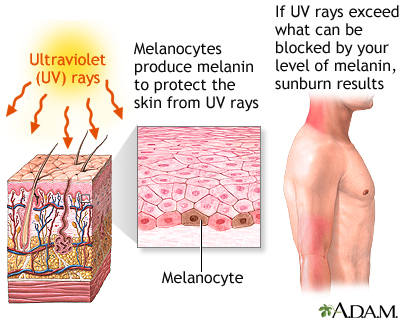Sunburn

What is Sunburn?
Sunburn is a type of skin damage caused by excessive exposure to ultraviolet (UV) radiation from the sun or artificial sources like tanning beds. It results in red, painful, and inflamed skin.
Who's at Risk for Sunburn?
Anyone exposed to UV radiation without adequate protection is at risk for sunburn. Fair-skinned individuals, people with a history of sunburn, those living in sunny regions, and individuals who spend a lot of time outdoors are particularly susceptible.
What Causes Sunburn?
Sunburn is caused by overexposure to UV radiation. When the skin absorbs excessive UV radiation, it triggers inflammation and damages the DNA in skin cells, leading to the characteristic redness, pain, and swelling.
How does Sunburn Start?
Sunburn usually starts a few hours after exposure to the sun. The skin may initially appear red and feel warm, followed by increasing pain and discomfort.
What are the Symptoms of Sunburn?
Symptoms of sunburn include redness and tenderness of the skin, pain or itchiness, swelling, blisters (in severe cases), and peeling of the affected area.
How is Sunburn Diagnosed?
Sunburn is typically diagnosed based on the characteristic appearance of the skin and the history of exposure to UV radiation. In severe cases, a healthcare professional may assess the extent of the burn and provide appropriate treatment.
How can Sunburn be Treated?
Treatment for sunburn aims to relieve symptoms and promote healing. This includes taking cool baths or applying cool compresses, using moisturizers or aloe vera gel, taking over-the-counter pain relievers, and staying hydrated. Severe sunburn may require medical intervention.
What Complications may Occur with Sunburn?
Severe sunburn can lead to complications such as blistering, infection, heatstroke, and an increased risk of developing skin cancer in the long term.
How can I Prevent Sunburn?
Preventing sunburn involves taking measures to protect your skin from excessive UV radiation. This includes wearing protective clothing, using broad-spectrum sunscreen with a high SPF, seeking shade during peak sun hours, and wearing sunglasses and a wide-brimmed hat.
Long-term Management of Sunburn
Long-term management of sunburn primarily involves preventing future sunburns through consistent sun protection practices and regular skin examinations for signs of skin cancer.
What is Recent Research Saying About Sunburn?
Recent research on sunburn focuses on understanding the mechanisms of UV-induced skin damage, developing more effective sunscreen formulations, and educating the public about the importance of sun protection.
Where can I go for More Information on Sunburn?
For more information on sunburn, you can visit reputable sources such as the American Academy of Dermatology, the Skin Cancer Foundation, or the Centers for Disease Control and Prevention (CDC).

